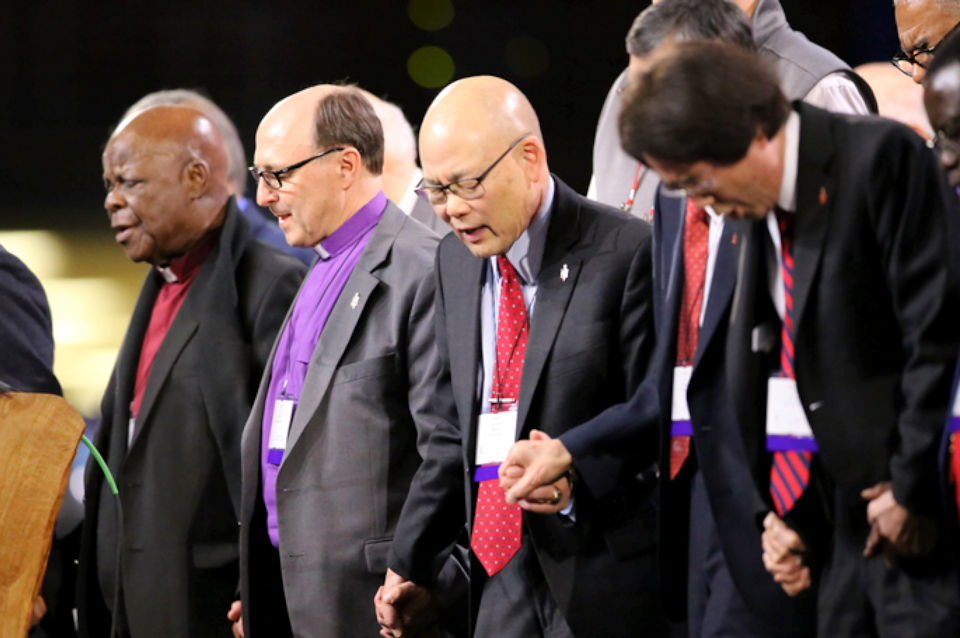Interesting times call for out of the ordinary actions. Bishop David Bard recalls a conference speaker’s words about a “liminal season,” as he explains the reasons for a special annual conference session.
BISHOP DAVID BARD
Michigan Area
In a speech given in South Africa in 1966, Senator Robert Kennedy noted that there was a Chinese curse, “May you live in interesting times.” There may or may not be such a curse in the Chinese tradition, but the story continues to circulate. We live in interesting times, and it can feel a bit like a curse sometimes.
Church consultant Susan Beaumont, our keynote speaker at my first Annual Conference with you here in Michigan, characterizes our times a bit differently. In her new book, How to Lead When You Don’t Know Where You’re Going, Beaumont writes that we are living in a “liminal season.” Liminal seasons are times in personal life and organizational life when something is ending, but a new thing has not yet begun. “Liminal seasons are challenging, disorienting, and unsettling.” This can feel a bit like a curse.
Acts 15 describes a liminal time. The Jesus movement is emerging from within the Jewish religious tradition. Something new is happening, but it is not always clear what that means. There are disagreement and controversy. There is need for discernment, for taking time to discover what “has seemed good to the Holy Spirit and us.” (Acts 15:28)
Interesting times and liminal seasons may ask that we do some things differently. One of the things we are doing differently is convening a special session of our Annual Conference. The purpose of that special session is to decide whether or not we will approve sending legislative petitions to General Conference generated from the Protocol on Reconciliation and Grace Through Separation released on January 3.
The question is not whether we as a conference fully support the Protocol legislation, but rather do we think the delegates to General Conference 2020 should have the full opportunity to consider these petitions as they do their work on behalf of The United Methodist Church. For more detailed information about the upcoming session of the Annual Conference on March 7, please see the Call Letter, and the FAQ.
We live in interesting times, in a liminal season, and we seek to discern what might seem good to the Holy Spirit and us.
Allow me to remind us about the Protocol of Reconciliation and Grace Through Separation, what it is, how it came to be, and why a special session of the annual conference is needed.
The Protocol was a negotiated proposal put forward by a carefully selected group of United Methodists working with a professional mediator. The group was diverse geographically, theologically, and socially. The Protocol proposes moving through our long and increasing acrimonious debate about how LGBTQ persons will be included in The United Methodist Church through separation.
The Protocol was not an initiative of the Council of Bishops. It began with invitations from Bishop John Yambasu of Sierra Leone, who was concerned about the state of the church following General Conference 2019. It was not until the November meeting of the Council of Bishops that any official notice was given to the bishops about the Protocol.
While the Protocol offers some hope that we might move differently into the future, there is grief in the idea that separation may be necessary. Separating the church would not be my first choice, yet space is needed in The United Methodist Church. Our proximity amid our deep differences has only led to increasing anger and acrimony, damaging our Christian witness to the world.
I am calling our annual conference into special session because I believe in this liminal season, the delegates to General Conference need the opportunity to consider every good option for the future of our church. If our annual conference approves sending the legislation based on the Protocol, it ensures that the legislation will get to General Conference (please see the FAQ for the technical reasons for this).
Let me be clear, at both the Annual Conference and at General Conference it is the members or delegates who will decide. Michigan United Methodists gathered for this special session of the annual conference will decide if we want to serve the wider church by forwarding this legislation. Delegates to General Conference will decide what to do with the legislation. Calling a special session of annual conference is uncomfortable, yet discomfort accompanies liminal seasons.
I make no predictions about the fate of the Protocol legislation at General Conference. Though the group that produced it is widely representative of the United Methodist Church, and though they were diligent in working with a mediator, there is no guarantee that the delegates to General Conference will approve this plan. Other plans will also be presented.
Your thoughts, your prayers, your discernment are important and valued. We live in interesting times. We live in a liminal season. Yet all times, all seasons belong to the God of Jesus Christ, who has “given us a new birth into a living hope through the resurrection of Jesus Christ.” (I Peter 1:3)
Last Updated on December 29, 2022

